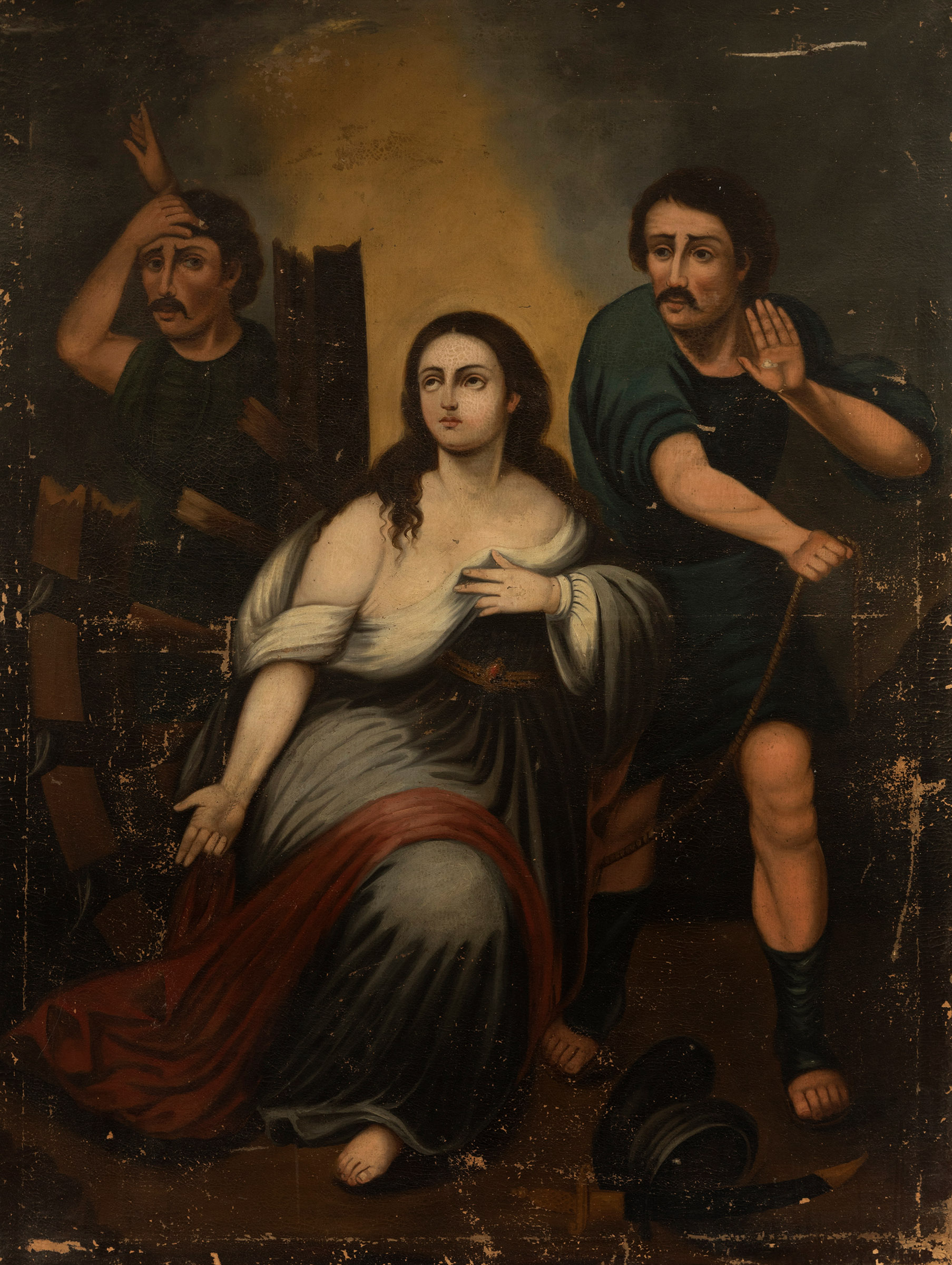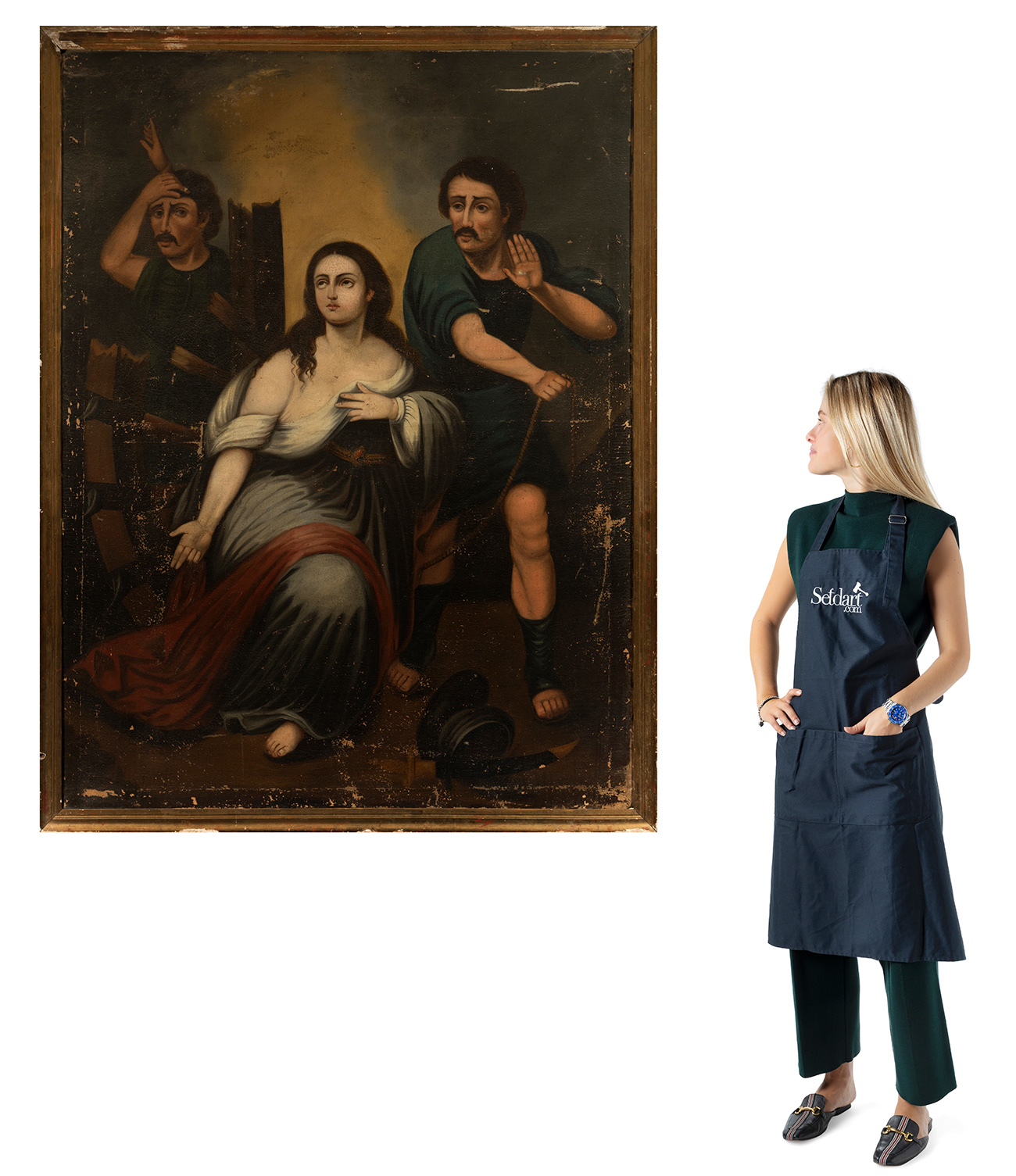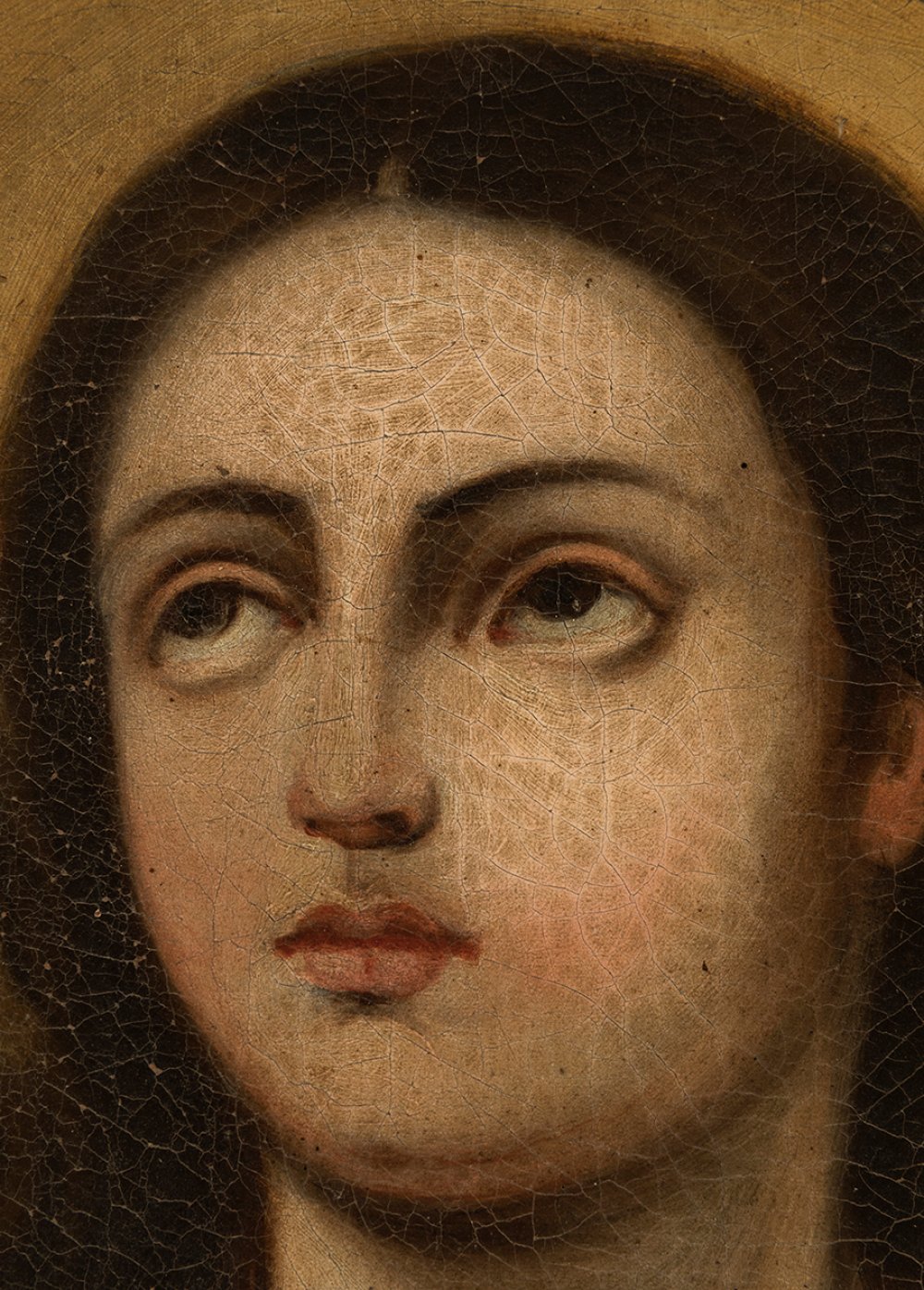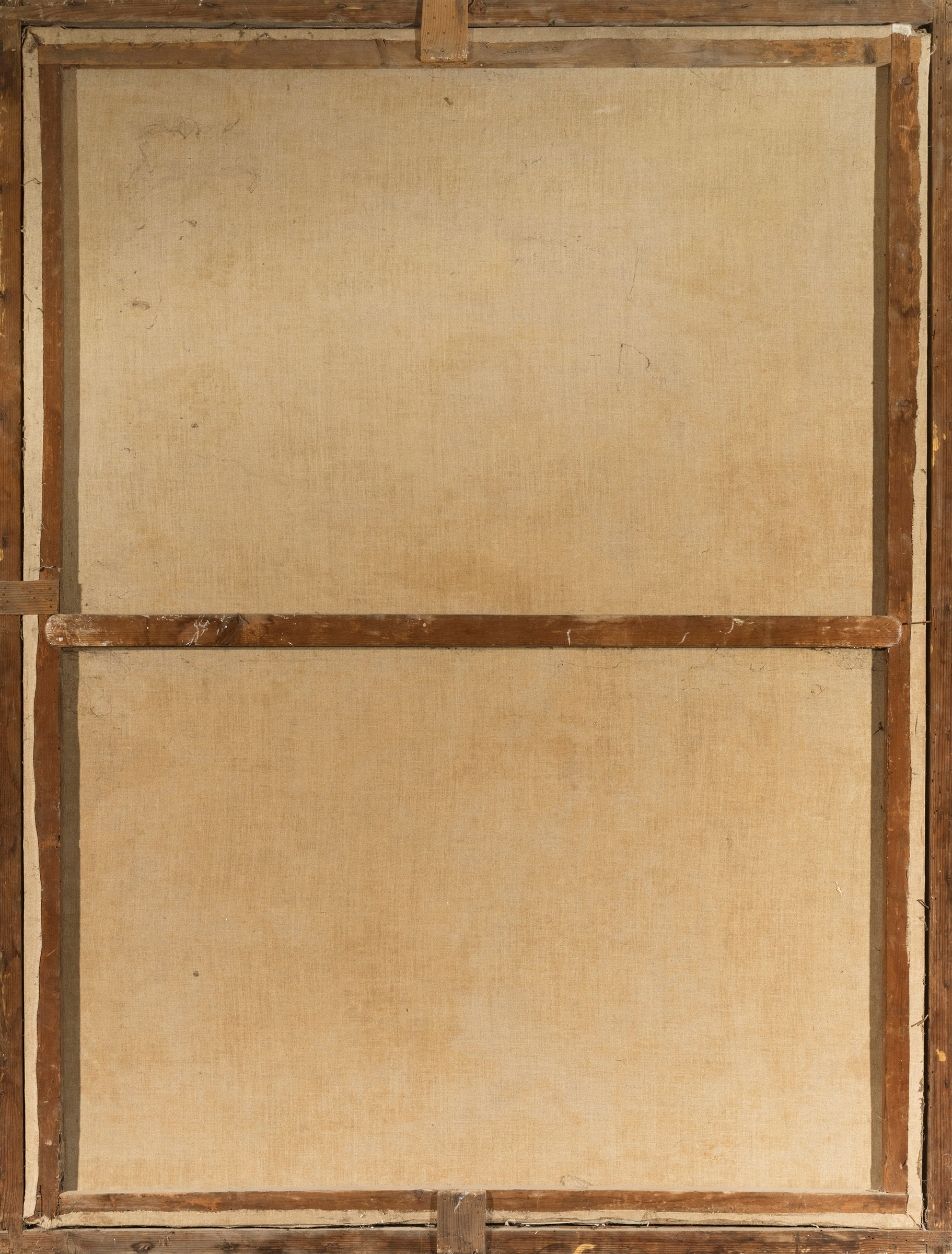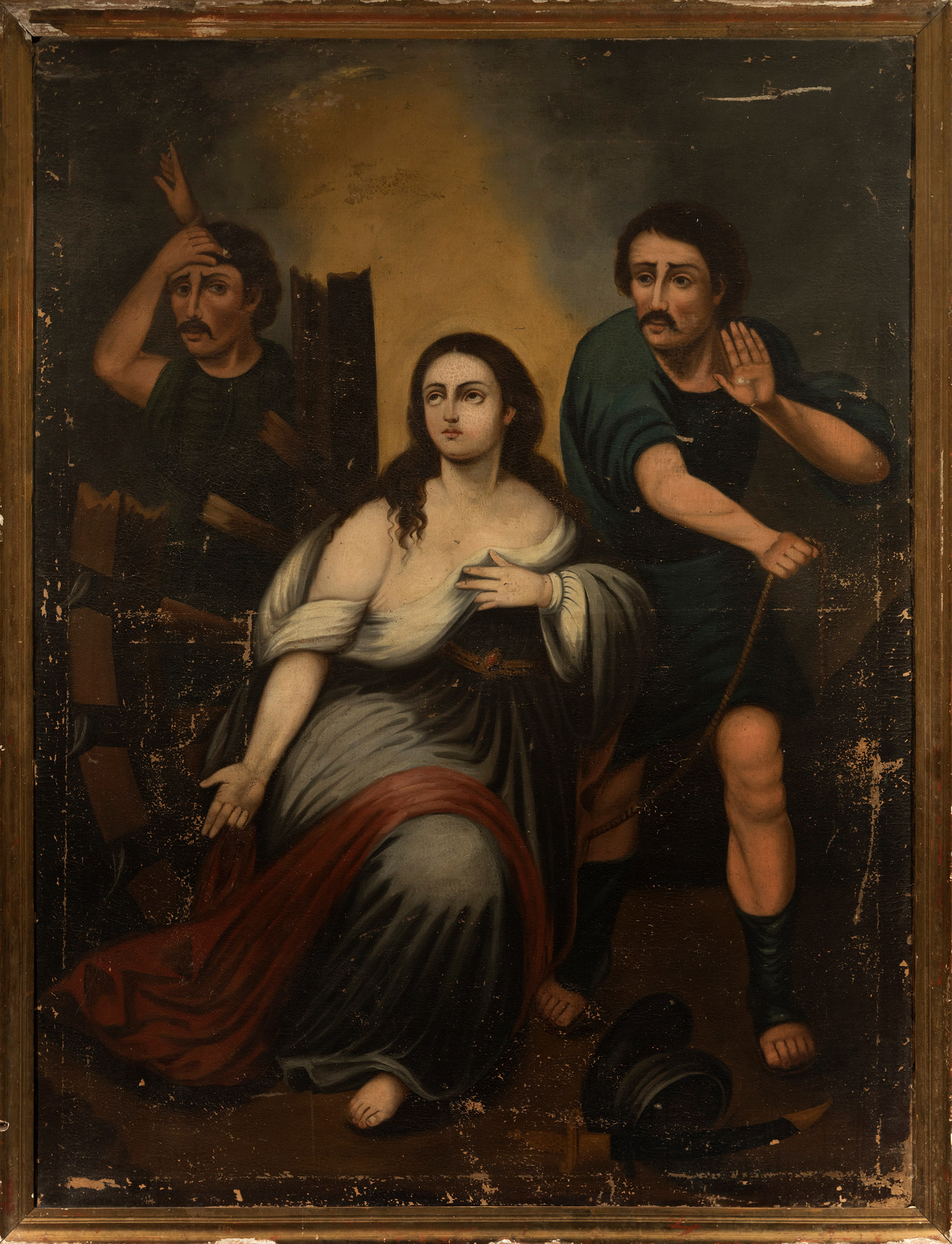48
Andalusian school; 18th century."Martyrdom of Saint Catherine".Oil on canvas. Re-drawn.It presents
"Martyrdom of Saint Catherine".
Oil on canvas. Re-drawn.
It presents jumps in the pictorial surface.
Measurements. 165 x 124,4 cm; 175 x 134 cm (frame).
In this canvas we see the representation of the martyrdom of Saint Catherine, specifically the moment in which the wheel with which she was being tortured breaks due to divine intervention. It is therefore a mystical approach to the theme, far removed from the most bloody formulas, although not without drama. The saint is depicted in the centre, standing and looking up to the sky, illuminated by a golden ray of divine light. Next to her are two soldiers with almost identical features. The cult of Saint Catherine spread throughout Europe from the 6th century onwards, she is included in the group of the holy helpers and is invoked against sudden death. Catherine was born around 290 into a noble family in Alexandria. Gifted with a great intelligence, she soon stood out for her extensive studies, which placed her on the same level as the greatest poets and philosophers of the time. One night Christ appeared to her and she decided, at that moment, to consecrate her life to him and to consider herself his fiancée, in a sort of mystical marriage. When the Emperor Maximian came to Alexandria to preside over a great pagan festival, Catherine took advantage of the occasion to try to convert him to Christianity, which aroused his anger. To test her, Maximian imposed on her a philosophical debate with fifty wise men whom she would try to convert. Catherine succeeded, provoking the emperor's wrath. The emperor had the sages executed, but not before proposing to the saint that she marry one of them, which she flatly refused. The emperor then ordered her to be tortured using a machine with spiked wheels. Miraculously, the wheels broke when they touched Catherine's body, and she was finally beheaded.
The 17th century saw the arrival of the Baroque style in the Andalusian school, a style that would reach its full maturity at the end of the century, and also throughout the 18th century. With the new style came the triumph of naturalism over Mannerist idealism, a loose style and many other aesthetic liberties. At this time the school reached its greatest splendour, both in terms of the quality of the works and the primordial status of Sevillian Baroque painting. Thus, during the transition to the Baroque period, we find Juan del Castillo, Antonio Mohedano and Francisco Herrera el Viejo, whose works already display the rapid brushstrokes and crude realism of the style, and Juan de Roelas, who introduced Venetian colourism. The middle of the century saw the fullness of the period, with figures such as Zurbarán, a young Alonso Cano and Velázquez. Finally, in the last third of the century we find Murillo and Valdés Leal, founders in 1660 of an Academy where many of the painters active in the 18th century were trained, such as Meneses Osorio, Sebastián Gómez, Lucas Valdés and others.
"Martyrdom of Saint Catherine".
Oil on canvas. Re-drawn.
It presents jumps in the pictorial surface.
Measurements. 165 x 124,4 cm; 175 x 134 cm (frame).
In this canvas we see the representation of the martyrdom of Saint Catherine, specifically the moment in which the wheel with which she was being tortured breaks due to divine intervention. It is therefore a mystical approach to the theme, far removed from the most bloody formulas, although not without drama. The saint is depicted in the centre, standing and looking up to the sky, illuminated by a golden ray of divine light. Next to her are two soldiers with almost identical features. The cult of Saint Catherine spread throughout Europe from the 6th century onwards, she is included in the group of the holy helpers and is invoked against sudden death. Catherine was born around 290 into a noble family in Alexandria. Gifted with a great intelligence, she soon stood out for her extensive studies, which placed her on the same level as the greatest poets and philosophers of the time. One night Christ appeared to her and she decided, at that moment, to consecrate her life to him and to consider herself his fiancée, in a sort of mystical marriage. When the Emperor Maximian came to Alexandria to preside over a great pagan festival, Catherine took advantage of the occasion to try to convert him to Christianity, which aroused his anger. To test her, Maximian imposed on her a philosophical debate with fifty wise men whom she would try to convert. Catherine succeeded, provoking the emperor's wrath. The emperor had the sages executed, but not before proposing to the saint that she marry one of them, which she flatly refused. The emperor then ordered her to be tortured using a machine with spiked wheels. Miraculously, the wheels broke when they touched Catherine's body, and she was finally beheaded.
The 17th century saw the arrival of the Baroque style in the Andalusian school, a style that would reach its full maturity at the end of the century, and also throughout the 18th century. With the new style came the triumph of naturalism over Mannerist idealism, a loose style and many other aesthetic liberties. At this time the school reached its greatest splendour, both in terms of the quality of the works and the primordial status of Sevillian Baroque painting. Thus, during the transition to the Baroque period, we find Juan del Castillo, Antonio Mohedano and Francisco Herrera el Viejo, whose works already display the rapid brushstrokes and crude realism of the style, and Juan de Roelas, who introduced Venetian colourism. The middle of the century saw the fullness of the period, with figures such as Zurbarán, a young Alonso Cano and Velázquez. Finally, in the last third of the century we find Murillo and Valdés Leal, founders in 1660 of an Academy where many of the painters active in the 18th century were trained, such as Meneses Osorio, Sebastián Gómez, Lucas Valdés and others.
13th October - Old Masters
Sale Date(s)
Venue Address
General delivery information available from the auctioneer
Setdart offers Worldwide shipping
PICK UP IN ROOM: You can come and pick up your lots in our offices (Barcelona, Madrid or Valencia). At the moment of the withdrawal, you will be able to accept the current conditions of the lot by means of a document that you will sign.
YOU CAN SEND ANOTHER PERSON TO PICK UP: This person must present a signed authorization that you can find in our web page by accessing from BUY AT SETDART- LOGISTICS-DOWNLOAD AUTHORIZATION DOCUMENT. You can also send an e-mail with the requested data in AUTHORIZATION DOCUMENT to admin@setdart.com
Important Information
25% buyer´s premium
21% buyer´s premium at www.setdart.com
Terms & Conditions
The maximum period to pay the lots is 7 working days. You can pay either via bank transfer or with credit card through our platform www.setdart.com (we only accept VISA or Mastercard).
BUYER´S PREMIUM: 22% Hammer price + 21% VAT from the buyer´s premium
If your piece has more than 100 years, our Ministry of Culture requires an export certificate in order for the piece to leave the country. Note that if the piece goes inside the EU, there is no cost for the export certificate. If the piece goes outside the EU, there is a cost for the export certificate. You can find more information in our Ministry of Culture website: https://www.culturaydeporte.gob.es/en/cultura/patrimonio/exportacionimportacion/exportacion/tasas.html
INQUIRIES: admin@setdart.com
Setdart guides you through the entire process, from the time of award to the day you receive your lot. Our logistics team will be happy to manage your transport, and will advise you on the best shipping method with professionals from the sector used to handling works of art and jewelry.
WE OFFER WORLDWIDE DOOR TO DOOR SHIPPING
PICK UP IN ROOM: You can come and pick up your lots in our offices. At the moment of the withdrawal, you will be able to accept the current conditions of the lot by means of a document that you will sign.
YOU CAN SEND ANOTHER PERSON TO PICK UP: This person must present a signed authorization that you can find in our web page by accessing from BUY AT SETDART-LOGISTICS-DOWNLOAD AUTHORIZATION DOCUMENT. You can also send an e-mail with the requested data in AUTHORIZATION DOCUMENT to admin@setdart.com
SETDART IS NOT RESPONSIBLE FOR THE STATE OF THE PARTS ONCE THEY LEAVE OUR FACILITIES. MRW SHIPMENTS: Once the payment is made, your lot will be packed for shipment, the logistics department will send you an e-mail notifying you of the day it leaves our warehouse, changes of address cannot be made after receiving this e-mail.
INSURANCE INCIDENTS: Coverage for the value of the auction up to 3000 ? per shipment, if the value of the auction is higher, Setdart will send you a quote including the additional insurance. The insurance company WILL NOT BE RESPONSIBLE FOR THE SHIPMENT THAT EXCEEDS THAT AMOUNT AND IS NOT FULLY INSURED. MRW INCIDENTS: Maximum notification 48 hours after receipt, after which the insurance company WILL NOT BE RESPONSIBLE AND NO CLAIMS WILL BE ACCEPTED.
E-MAIL LOGISTICS: logistica@setdart.com
PICK UP YOUR MESSAGES: You can send your own messaging, prior notice via e-mail that your shipment is ready, please note 3 or 4 days in advance. This type of shipment is packaged so Setdart will provide you with a quote.
EXPENSES FOR STORAGE: We inform you that if the purchased lot is not picked up within a month, you will be charged 30€ per week per lot. Setdart Online S.L., owner of the web site "setdart.com", "setdart.net" and "setdart.org", acts as a company of Spanish nationality inscribed in the Volume 36955, sheet 182, page B-293056 of the Mercantile Registry, with registered office at Calle Aragó











